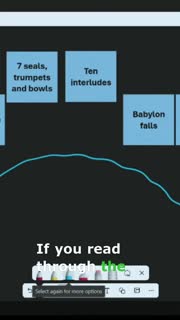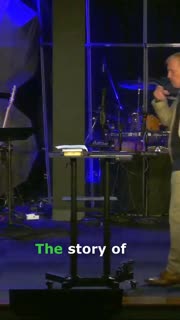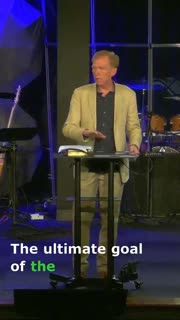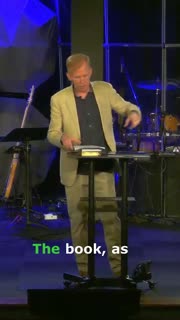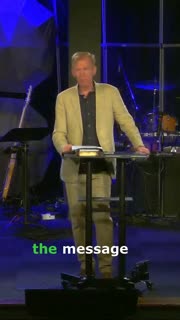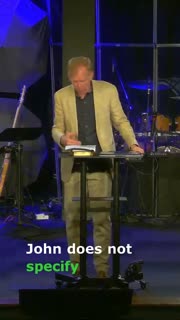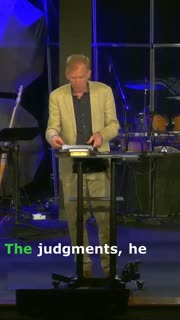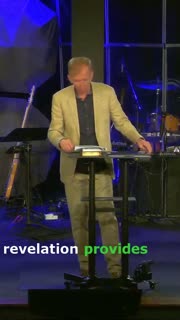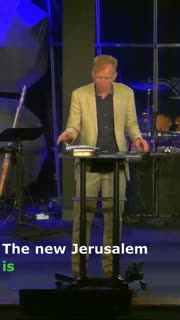God's Holiness and Hope in Revelation's Narrative
Summary
### Summary
The central theme of today's sermon is the holiness and sovereignty of God, as echoed in the repeated declaration, "Holy, holy, holy is the Lord God Almighty." This phrase underscores the majesty and purity of God, setting the stage for a deeper exploration of the book of Revelation. The sermon delves into the grand narrative of God's plan for humanity, from creation to the ultimate restoration of all things. It contrasts the story of God's kingdom with the various secular and religious ideologies that vie for our allegiance today, such as radical secularism, Christian nationalism, and civic religion.
John's Revelation is presented not merely as a prophecy about the end times but as a timeless message relevant to all generations. It calls believers to live as faithful followers of Christ in a world filled with competing narratives and injustices. The sermon emphasizes the importance of understanding the symbolic nature of Revelation's judgments, which are seen as divine disciplines aimed at turning people away from evil and towards God.
The sermon also highlights the hope and justice that are central to John's vision. Despite the graphic and often disturbing imagery of Revelation, the ultimate message is one of hope. The judgments are not about retribution but about erasing evil to make way for the new Jerusalem, a restored Eden where God's justice and peace reign supreme. This hope is especially poignant for those who are oppressed and marginalized, offering a vision of a future where all wrongs are made right.
The final part of the sermon focuses on the ultimate victory of the Lamb over the dragon, symbolizing the defeat of evil and the establishment of God's eternal kingdom. This victory is not achieved through physical battles but through the sacrificial love and justice of Christ. The new Jerusalem is depicted as an invitation to a restored Eden, where God's presence is fully realized, and His people live in perfect harmony with Him.
### Key Takeaways
1. The Holiness of God: The repeated declaration "Holy, holy, holy is the Lord God Almighty" serves as a powerful reminder of God's absolute purity and sovereignty. This foundational truth shapes our understanding of who God is and how we are to relate to Him. Recognizing God's holiness calls us to live lives that reflect His character and to approach Him with reverence and awe. [34:33]
2. The Grand Narrative: The story of Revelation is not just about the end times but encompasses the entire history of God's interaction with humanity. It provides a framework for understanding our place in God's plan and how we are to live as His followers. This narrative contrasts sharply with the secular and religious ideologies that dominate our world, offering a more satisfying and comprehensive vision of life. [42:03]
3. Judgments as Disciplines: The judgments in Revelation, often depicted in graphic and symbolic language, are better understood as divine disciplines. These are God's means of wooing people away from evil and towards righteousness. They serve a redemptive purpose, aiming to bring about repentance and transformation rather than mere punishment. [47:57]
4. The Melody of Hope: Amidst the vivid and often disturbing imagery of Revelation, there is a consistent melody of hope. John intersperses his visions of judgment with scenes of divine worship and ultimate victory, reminding believers that God's justice will prevail. This hope is a lifeline for those who are oppressed and marginalized, offering assurance that God will set all things right. [55:38]
5. The Ultimate Victory: The final battle between the Lamb and the dragon symbolizes the ultimate defeat of evil and the establishment of God's eternal kingdom. This victory is achieved not through physical warfare but through the sacrificial love and justice of Christ. The new Jerusalem represents the fulfillment of God's promise to restore creation, inviting us to live in perfect harmony with Him. [59:35]
### YouTube Chapters
[0:00] - Welcome
[34:33] - The Holiness of God
[42:03] - The Grand Narrative
[47:57] - Judgments as Disciplines
[55:38] - The Melody of Hope
[59:35] - The Ultimate Victory
[01:10:45] - Living as Team Lamb
[01:11:19] - Closing Prayer
[01:16:40] - Announcements and Thanks
Study Guide
### Bible Reading
1. Revelation 4:8 - "Each of the four living creatures had six wings and was covered with eyes all around, even under its wings. Day and night they never stop saying: 'Holy, holy, holy is the Lord God Almighty,' who was, and is, and is to come."
2. Revelation 21:1-4 - "Then I saw 'a new heaven and a new earth,' for the first heaven and the first earth had passed away, and there was no longer any sea. I saw the Holy City, the new Jerusalem, coming down out of heaven from God, prepared as a bride beautifully dressed for her husband. And I heard a loud voice from the throne saying, 'Look! God’s dwelling place is now among the people, and he will dwell with them. They will be his people, and God himself will be with them and be their God. He will wipe every tear from their eyes. There will be no more death or mourning or crying or pain, for the old order of things has passed away.'"
3. Revelation 22:1-3 - "Then the angel showed me the river of the water of life, as clear as crystal, flowing from the throne of God and of the Lamb down the middle of the great street of the city. On each side of the river stood the tree of life, bearing twelve crops of fruit, yielding its fruit every month. And the leaves of the tree are for the healing of the nations. No longer will there be any curse. The throne of God and of the Lamb will be in the city, and his servants will serve him."
### Observation Questions
1. What is the significance of the repeated declaration "Holy, holy, holy is the Lord God Almighty" in Revelation 4:8? How does this phrase shape our understanding of God's character? [34:33]
2. In Revelation 21:1-4, what are the key features of the new Jerusalem, and how do they contrast with the current world? [01:04:46]
3. According to Revelation 22:1-3, what are the symbolic elements described in the new creation, and what do they represent? [01:06:03]
4. How does the sermon describe the judgments in Revelation, and what purpose do they serve according to the pastor? [47:57]
### Interpretation Questions
1. How does recognizing God's holiness, as emphasized in Revelation 4:8, influence the way believers should live their lives? [34:33]
2. What does the vision of the new Jerusalem in Revelation 21:1-4 offer to those who are oppressed and marginalized, and how does it provide hope? [55:38]
3. The sermon suggests that the judgments in Revelation are divine disciplines rather than mere punishments. How does this perspective change the way we understand God's actions in the world? [47:57]
4. How does the ultimate victory of the Lamb over the dragon, as described in the sermon, redefine the concept of victory in the Christian faith? [59:35]
### Application Questions
1. Reflect on the holiness of God as described in Revelation 4:8. How can you incorporate a greater sense of reverence and awe for God's holiness in your daily life? [34:33]
2. The new Jerusalem is depicted as a place of ultimate justice and peace. In what ways can you work towards justice and peace in your community, reflecting the hope of the new Jerusalem? [01:04:46]
3. The sermon emphasizes that the judgments in Revelation are meant to turn people away from evil. Are there areas in your life where you feel God is disciplining you to bring about transformation? How can you respond to this discipline? [47:57]
4. The melody of hope is a recurring theme in Revelation. How can you maintain hope in the face of personal or societal injustices, and what practical steps can you take to share this hope with others? [55:38]
5. The ultimate victory of the Lamb is achieved through sacrificial love and justice. How can you embody sacrificial love in your relationships and community, following the example of Christ? [59:35]
6. The sermon calls believers to live as faithful followers of Christ amidst competing narratives. What are some secular or religious ideologies you encounter, and how can you stay true to the grand narrative of God's kingdom? [42:03]
7. Reflect on the vision of the new creation in Revelation 22:1-3. How does this vision inspire you to live differently now, knowing that God's ultimate plan is to restore all things? [01:06:03]
Devotional
Day 1: The Holiness of God
The repeated declaration "Holy, holy, holy is the Lord God Almighty" serves as a powerful reminder of God's absolute purity and sovereignty. This foundational truth shapes our understanding of who God is and how we are to relate to Him. Recognizing God's holiness calls us to live lives that reflect His character and to approach Him with reverence and awe. The holiness of God is not just an abstract concept but a reality that should influence every aspect of our lives. It calls us to a higher standard of living, one that mirrors the purity and majesty of our Creator. [34:33]
Isaiah 6:3-4 (ESV): "And one called to another and said: 'Holy, holy, holy is the Lord of hosts; the whole earth is full of his glory!' And the foundations of the thresholds shook at the voice of him who called, and the house was filled with smoke."
Reflection: In what ways can you reflect God's holiness in your daily actions and decisions? How can you cultivate a deeper sense of reverence and awe for God in your life today?
Day 2: The Grand Narrative
The story of Revelation is not just about the end times but encompasses the entire history of God's interaction with humanity. It provides a framework for understanding our place in God's plan and how we are to live as His followers. This narrative contrasts sharply with the secular and religious ideologies that dominate our world, offering a more satisfying and comprehensive vision of life. Understanding this grand narrative helps us to see our lives in the context of God's eternal plan, giving us purpose and direction. [42:03]
Ephesians 1:9-10 (ESV): "Making known to us the mystery of his will, according to his purpose, which he set forth in Christ as a plan for the fullness of time, to unite all things in him, things in heaven and things on earth."
Reflection: How does understanding the grand narrative of God's plan change your perspective on your daily life and struggles? What steps can you take to align your life more closely with God's eternal purpose?
Day 3: Judgments as Disciplines
The judgments in Revelation, often depicted in graphic and symbolic language, are better understood as divine disciplines. These are God's means of wooing people away from evil and towards righteousness. They serve a redemptive purpose, aiming to bring about repentance and transformation rather than mere punishment. This perspective helps us to see God's judgments not as acts of wrath but as expressions of His love and desire for our ultimate good. [47:57]
Hebrews 12:6-7 (ESV): "For the Lord disciplines the one he loves, and chastises every son whom he receives. It is for discipline that you have to endure. God is treating you as sons. For what son is there whom his father does not discipline?"
Reflection: How can you view the challenges and difficulties in your life as opportunities for growth and transformation? What is one area where you feel God is calling you to turn away from evil and towards righteousness?
Day 4: The Melody of Hope
Amidst the vivid and often disturbing imagery of Revelation, there is a consistent melody of hope. John intersperses his visions of judgment with scenes of divine worship and ultimate victory, reminding believers that God's justice will prevail. This hope is a lifeline for those who are oppressed and marginalized, offering assurance that God will set all things right. The message of hope in Revelation encourages us to persevere in faith, knowing that God's ultimate victory is assured. [55:38]
Romans 15:13 (ESV): "May the God of hope fill you with all joy and peace in believing, so that by the power of the Holy Spirit you may abound in hope."
Reflection: In what areas of your life do you need to be reminded of God's hope and justice? How can you share this message of hope with someone who is feeling oppressed or marginalized today?
Day 5: The Ultimate Victory
The final battle between the Lamb and the dragon symbolizes the ultimate defeat of evil and the establishment of God's eternal kingdom. This victory is achieved not through physical warfare but through the sacrificial love and justice of Christ. The new Jerusalem represents the fulfillment of God's promise to restore creation, inviting us to live in perfect harmony with Him. This vision of ultimate victory gives us confidence and courage to live as faithful followers of Christ, knowing that His love and justice will prevail. [59:35]
1 Corinthians 15:57-58 (ESV): "But thanks be to God, who gives us the victory through our Lord Jesus Christ. Therefore, my beloved brothers, be steadfast, immovable, always abounding in the work of the Lord, knowing that in the Lord your labor is not in vain."
Reflection: How does the vision of Christ's ultimate victory influence your daily life and decisions? What is one way you can embody the sacrificial love and justice of Christ in your interactions with others today?
Quotes
### Quotes for Outreach
1. "If you read through the scriptures from Genesis to Revelation, you realize this is the story of everything. This is about who God is and why God created this world and why he created humanity and what he created them for and how God intervenes in history and how God is eventually going to bring all this thing to a conclusion." (20 seconds)
2. "The story of everything is bigger than all that. It's more satisfying than all that. So, to engage in the world that you and I live in. It was appropriate for John's original hearers in the first century, and it's appropriate for us now in the 21st century as we're looking around and saying, what am I supposed to do with all this? What is my life all about?" (28 seconds)
3. "The ultimate goal of the judgments that John describes is not retribution or vengeance. It's the elimination of the dragon and evil and injustice in order to make room for new Jerusalem. The new Jerusalem to arrive, evil has to go. The dragon has to go." (26 seconds)
4. "The book, as one author says, is not about finding joy in unbelievers getting their comeuppance. No, this is about the defeat of the dragon and the systemic evils in Babylon. The celebration is not personal vengeance, but cosmic justice. That's why this is a story about hope and justice." (25 seconds)
5. "The message of Revelation, it's the same. It's for you. The message is, the Lamb will win. The Lamb will win. We can have hope now because this is not the end of the story. John shows us the end of the story. And in the end of the story, team Lamb wins. And the dragon and injustice and evil are forever destroyed." (32 seconds)
### Quotes for Members
1. "John does not specify how to engage in politics, right, as a follower of the Lamb. Instead, John instructs Christians how to discern the moral character of governments and politicians and policies and laws. John takes the stance of a dissident Christian, and he takes the stance of a dissident Christian. He's a dissident disciple who lives out a story unlike anything the world has to offer." (27 seconds)
2. "The judgments, he suggests, are better understood as disciplines. Disciplines, by which he means God is actually trying through these judgments or disciplines to woo people from Team Dragon, if you weren't here last week, sorry about that. We did talk a little bit about it, to Team Lamb. In other words, to say, you know what? I want to be one of those people who are following the Lamb." (27 seconds)
3. "John's revelation provides that the deepest desire of the oppressed is to see justice and John says over and over and over with these interludes justice is coming. Later this week our nation will celebrate Juneteenth that moment in our history when finally the last group of African-American slaves were told hey you know what justice is finally being done you're finally being set free." (32 seconds)
4. "The new Jerusalem is your invitation to Eden. Eden, that garden, that place where God started all of this. Right? Before the dragon shows up, before the tempter shows up, before the agent of chaos, of anti-creation, of destruction in God's world. When evil is erased, then the new Jerusalem can begin. It's an act of new creation by God." (26 seconds)
5. "To the churches in the 21st century and the church in the 1st century, the message is the same. The Lamb will completely defeat the dragon. And Babylon. And then comes the new Jerusalem. And this is what John is trying to help us see. Like in the middle of what you're dealing with now, don't forget what God is up to and what God is going to finish." (25 seconds)
